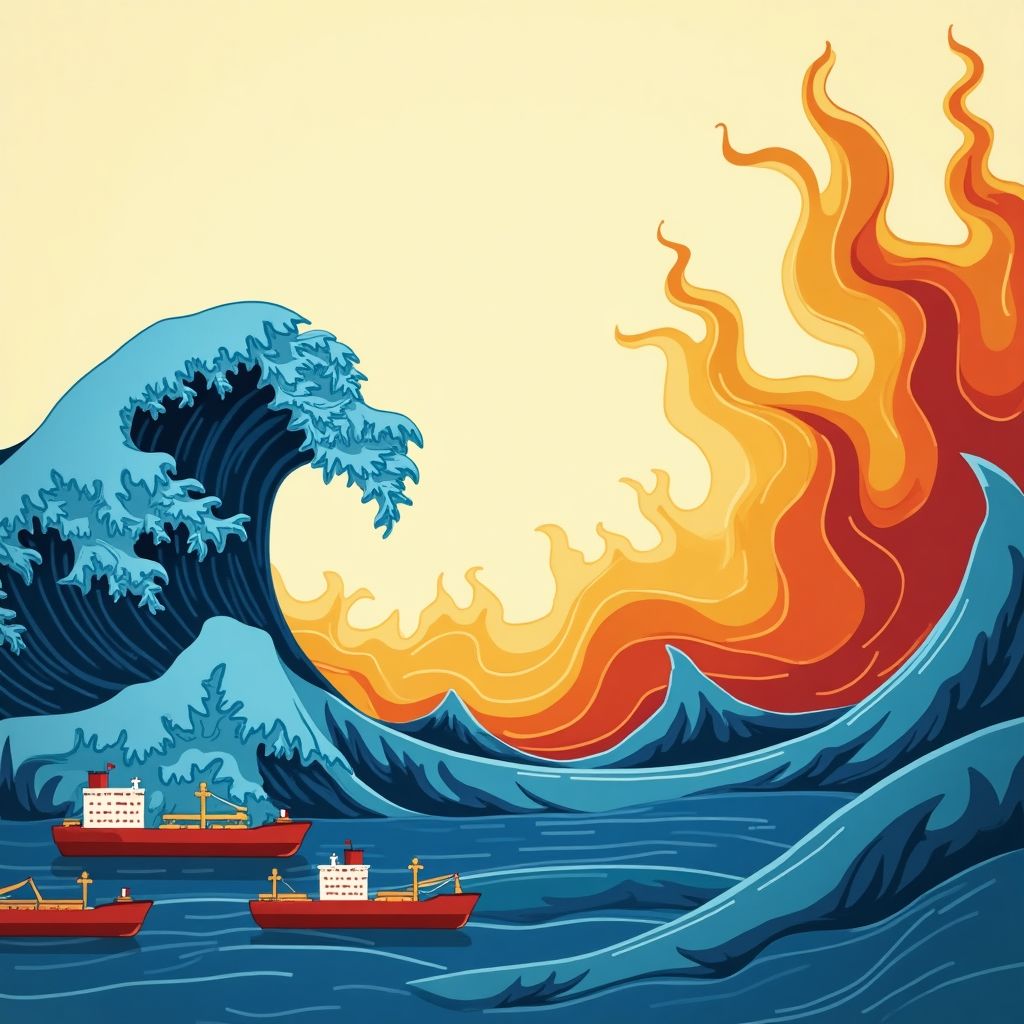In a world where you can be anything, be strategic. - Unknown. In the tumultuous sphere of international relations, strategy is king. One false move, and the global house of cards can come tumbling down. This is the central theme in Peter Zeihan's insightful video from Zeihan on Geopolitics, where he dives into the intricacies awaiting the Trump administration in dealing with Iran during a potential second term. The question lurking in the shadows remains: Can a sledgehammer approach work in nuclear diplomacy where precision and finesse are paramount?
Peter Zeihan, a well-respected geopolitical analyst, takes us on a whirlwind journey through the treacherous waters of international diplomacy. Broadcasting from the scenic shores of Blenheim, New Zealand, he doesn't merely scratch the surface. He digs deep into the dilemmas President Trump might face if the White House once again embraced his leadership style, one often characterized by big ambitions and bold actions.
Iran, unlike China and Russia, presents a unique geopolitical canvas. Since the 1979 Iranian Revolution, the United States and Iran have danced a complex diplomatic tango, their relationship colored by stark contrasts and historic disputes. Yet, Zeihan argues that Iran might just be Trump's playground, where his straightforward tactics could bear unusual fruit.
The Iranian enigma is not just about a nation isolated by sanctions and economic embargoes. It's a portrait of survival amidst adversity, with Tehran employing creative strategies, such as developing a "shadow fleet" to export its oil. These stealthy ships elude the prying eyes of global finance by not using transponders and sidestepping conventional financial systems. For Iran, it's a high-stakes game of hide and seek on the open seas. But what if this house of cards were to crumble?
The Trump Playbook: Smash with Precision?
The Trump approach to diplomacy often evokes imagery of a bull in a china shop—bold, fearless, but sometimes detrimental. Zeihan doesn't sugarcoat it. He notes that this style didn't bode well in the nuanced arenas of China and Russia; these giants require tact, patience, and an intricate web of alliances to navigate. But could Iran be Trump's golden ticket to diplomatic success without compromise?
The scenario Zeihan paints suggests that Iran, unlike the towering trade partners, doesn't require the United States to tiptoe around complex economic entanglements. Iran's economic isolation means that Trump's maximalist tactics may not send shockwaves through the global market in the same way a move against China or Russia might.
This isn't to say the task is easy. Zeihan explores the idea of secondary sanctions—a potent tool in economic warfare. The challenge lies in rounding up enough international allies to enforce these sanctions effectively. Previously, European nations, such as Germany and France, often danced to their own tune, prioritizing their diplomatic autonomy. But recent developments in the Middle East have shifted perspectives. European resolve against Iranian provocations has hardened, and this could open new doors for a Trump-led offensive.
Into the Shadows: Iran's Stealth and Strategy
Zeihan dives into the clandestine world of the "shadow fleet," the secretive ensemble of tankers that keep Iranian oil flowing amidst a sea of sanctions. He highlights the nuances of a system where cash and gold are exchanged under the radar, bypassing formal financial channels. Disrupting this fleet, Zeihan posits, might be child's play for the U.S. Navy, but it's not without risks.
Engaging with this shadowy network could shatter the maritime system, leaving insurers scrambling and triggering a domino effect through global supply chains. The adventures of Iran's clandestine tankers, threading through the Indian Ocean Basin, mirror scenes from a high-seas thriller. But in a real-world scenario, the stakes are unfathomably higher.
Imagine a world where the oceans are no longer vast open highways of trade. Zeihan warns that a full-on assault on Iran’s shadow fleet might usher in an era of fragmented maritime routes and strained international relations. The irony? Such chaos would echo the warnings from Obama's era, noting globalization’s brittle foundations.
As Trump prepares his hypothetical second act, Zeihan suggests that his administration might wield this strategy with giddy anticipation. Yet, the looming question remains: Can Trump and his team avoid the pitfalls that ensnared their geopolitical predecessors?
The Elephant in the Room: Consequences and Escalation
In geopolitics, every action has an equal and opposite chain reaction. Escalating tensions by aggressively targeting Iran could fragment not just maritime stability but global political rapports. Zeihan underscores the potential risks: an unsupervised dismantling of the maritime ecosystem could ripple through energy, agriculture, and manufacturing sectors globally.
Imagine navigating an ocean without a map or a compass. That's the future Zeihan foresees if the world doesn’t adapt to a recalibrated balance of naval power. Should the Trump administration proceed without an alternative framework to uphold maritime safety and economic stability, we could end up in uncharted waters, quite literally.
Lessons from the Past, Visions for the Future
To understand tomorrow's geopolitical landscape, Zeihan suggests we must learn from the past. The drawing board requires not just courage but meticulous craftsmanship—a talent not always associated with Trump’s leadership ethos. Even George H.W. Bush, a president with strategic fluency, opted for different methods that did not see the light, leaving globalization’s flaws festering beneath the surface for decades.
The incoming years promise to test international resilience. Zeihan’s visual narrative challenges a proverbial question: What comes next in the ever-expanding geopolitical chessboard? Will Trump's approach, characterized by sweeping gestures and grand narratives, offer a viable path to greater security and influence?
The irony of potential Trump-era policies lies in their unique positioning—a mix of naivety and bravado. Zeihan’s narrative encourages us to reevaluate preconceived norms. It’s a stark reminder that sometimes the simplest solutions might lead to the most unexpected consequences.
As the world watches the Trump administration's maneuvers unfold, the fate of diplomacy, economic stability and international relations hang in a delicate balance. Zeihan leaves us not just with answers, but thought-provoking questions that demand critical reflection from both policymakers and citizens alike.
Will Trump's sledgehammer diplomacy genuinely crack the code of Iran’s geopolitics? Or will it inadvertently draw new lines of division across the global stage?
Join the Conversation
We want to hear your thoughts! Join the iNthacity community, and engage in our vibrant discussions about geopolitics, strategic diplomacy, and global affairs. Could you be part of the change? Apply to become a permanent resident, then perhaps a citizen, of the "Shining City on the Web". Share this article, leave a comment, and tell us: How do you believe the Trump approach will shape future geopolitical landscapes?
Wait! There's more...check out our fascinating short story that continues the journey: A Night to Remember
Disclaimer: This article may contain affiliate links. If you click on these links and make a purchase, we may receive a commission at no additional cost to you. Our recommendations and reviews are always independent and objective, aiming to provide you with the best information and resources.
Get Exclusive Stories, Photos, Art & Offers - Subscribe Today!


























Post Comment
You must be logged in to post a comment.